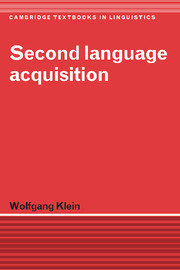PART II - From the learner's point of view
Published online by Cambridge University Press: 05 June 2012
Summary
In the second part of this book we will attempt to trace the ways in which learners utilize the linguistic input available to them in order to develop their individual language varieties and, in doing so, how they gradually approximate to the target language. Since we are not primarily interested in finding out how this works when the learner is under the influence of a specific teaching method, examples from spontaneous second language acquisition will generally be used. The process in question shows two kinds of regularity:
(a) Every learner variety, no matter how elementary and inadequate it might be, constitutes a system in itself whereby the learner can meet at least some of his communicative needs. The efficiency of the system depends not only on the linguistic repertoire developed by the learner but also on the latter's proficiency in handling the system.
(b) The transition from one learner variety to the next follows a certain pattern: it is a shift to a different and, as one would hope, more advanced system. Such a transition can take place only as long as the learner is in a position to notice a discrepancy between his particular language variety and the target itself. The scale of the problem grows as successive learner varieties approximate the target language more closely.
Chapter 4 gives an overview of the formidable task faced by the learner and, for purposes of analysis, this will be subdivided into four problems, which are then examined in more detail in chapters 5–8.
- Type
- Chapter
- Information
- Second Language Acquisition , pp. 57 - 58Publisher: Cambridge University PressPrint publication year: 1986



